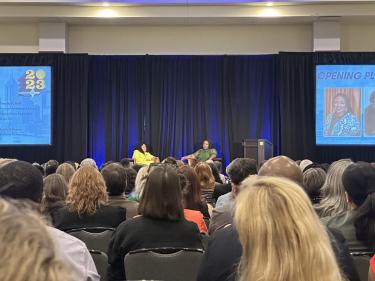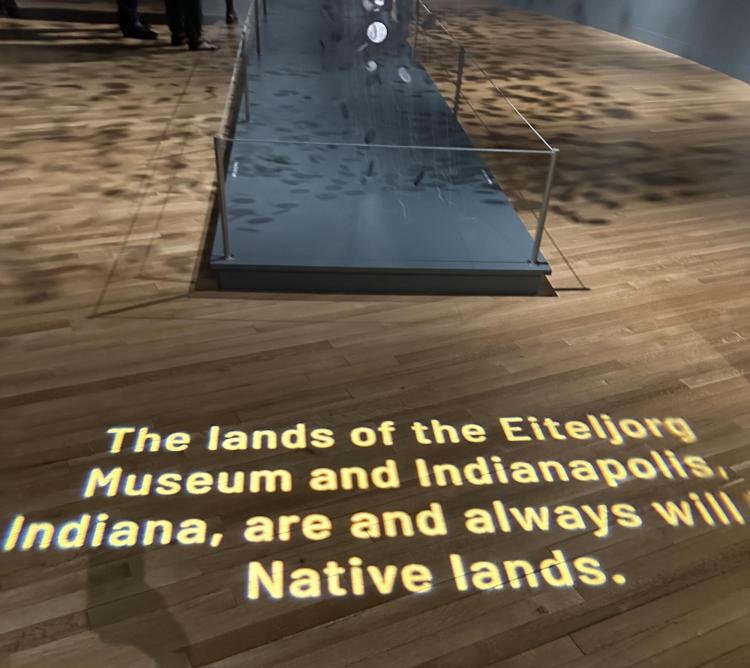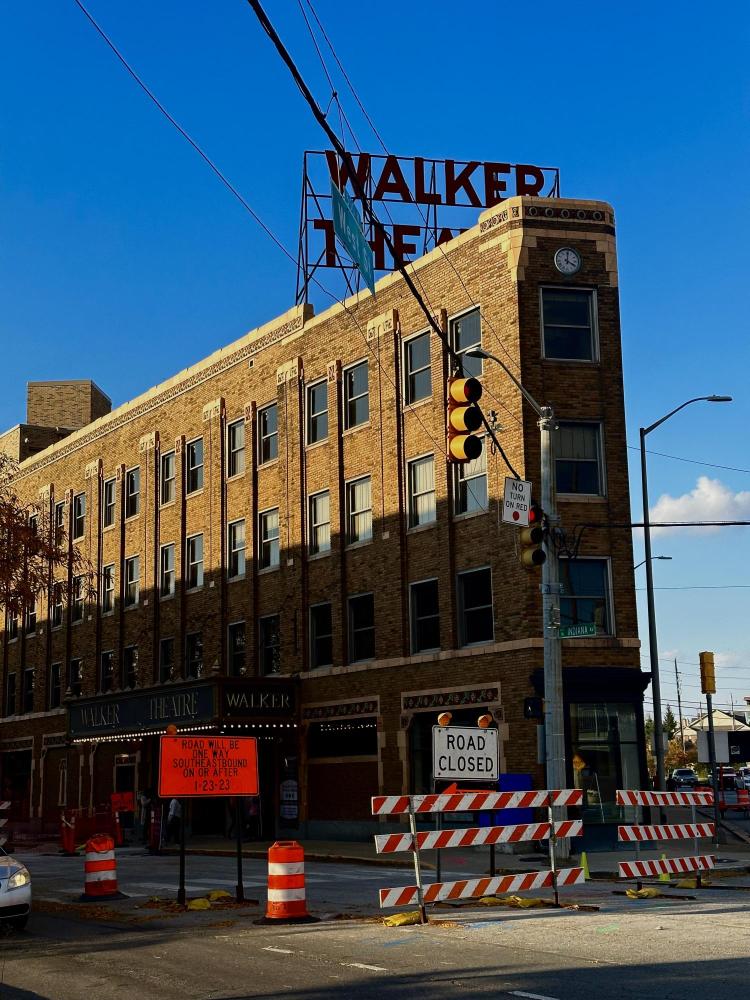By: Nandi Pointer
Traveling to Indianapolis, Indiana in October to attend the 2023 National Humanities Conference (NHC) for the first time, I was a little nervous and unsure about what to expect. My fears were put to rest the night of the opening plenary session. A packed conference room was ignited by a lively and fascinating discussion with Tracie Hall, former executive director of the American Library Association, and Indiana author Leah Johnson, who discussed the importance of books in our society and the threats that book bans pose. “The humanities matter because a world without books and without poetry and without museums isn’t a world at all. The humanities are our stories: They give meaning to our lives. It’s our job to lift up the  storytellers. To say the world is complex but here is where we stand, here is where we find beauty, every day,” said NHC Chair Shelly C. Lowe. To end the night, attendees headed to Eiteljorg Museum of American Indians and Western Art for the opening reception. A beautiful space, attendees were able to reconnect with colleagues and learn from the Museum’s curators about the artwork, all while making new connections within the academy. The weather was unseasonably warm, a mild 71 degrees.
storytellers. To say the world is complex but here is where we stand, here is where we find beauty, every day,” said NHC Chair Shelly C. Lowe. To end the night, attendees headed to Eiteljorg Museum of American Indians and Western Art for the opening reception. A beautiful space, attendees were able to reconnect with colleagues and learn from the Museum’s curators about the artwork, all while making new connections within the academy. The weather was unseasonably warm, a mild 71 degrees.
As I walked back to the Marriott Hotel that evening, I felt inspired and invigorated by the day’s events.
A third year PhD student in Media Studies, I was presenting, with my advisor, Dr. Sandra Ristovska, as part of the panel Making Pathways Meet: Promising Directions for Publicly Engaged Doctoral Training. The panel consisted of fellows or participants in projects funded by the Mellon/ACLS Scholars and Society Fellowship—a 2019-2021 program intended to support doctoral faculty as they advance publicly engaged humanities research and promote change in doctoral education.The guide explores a range of curricular and program innovations and the opportunities they present from archival research in local communities to incorporating land-based pedagogy in connecting and supporting Indigenous students. Mellon/ACLS Scholars and Society fellow, Dr. Sandra Ristovska, organized a career diversity series in 2022-2023 on visual media, justice, and human rights for faculty and graduate students at CU. Described by one PhD student as “eye opening and expansive,” the series featured talks by eight national and international experts with doctoral degrees who work across the private and public sector, leveraging their work with visual media into various domains. 
The series provided models and inspiration for graduate students interested in doing justice-driven publicly engaged work and also facilitated informal networking. I worked as a graduate research assistant on the project and co-authored a reflection piece, Exploring Diverse Justice-Driven Careers for Publicly Engaged Doctoral Students with Dr. Ristovska that highlighted takeaways and potential next steps from the series. The projects presented at the panel focused on communities, the classroom, and supporting students’ selves and futures. Esmeralda Salas who worked on the project Build Bridges, Not Walls: Connecting Campus and Community stated, “It was exciting to meet scholars doing community engaged research. I came away from it with a renewed sense of excitement knowing there are many more ways to make academia legible to the public.” At a beautiful reception the next afternoon at OPI in the JW Marriott John Paul Christy, the senior director of programs at ACLS stated, “ I was so thrilled by the amazing presentations. There is some really inspiring material in the forthcoming report.”
My final night at the conference I attended the Capps Lecture at the Madam Walker Legacy Center, which featured A’Leila Bundles, author, journalist and descendent of Madam C. J. Walker, in conversation with Tyrone McKinley Freeman, an associate professor at Indiana University. They spoke about their personal journeys to the humanities and shared a bit of their family history, speaking to the importance of telling everyone’s story. Sitting in the beautiful, historic Walker Theatre, built in 1927, and one of the last surviving iconic buildings on Indiana Avenue, I felt as if I was connecting to an important piece of my own history, as a Black American woman.
All in all, the conference proved to be a wonderful and impactful experience filled with moments of both connection, laughter, and inspiration. In speaking to the importance of graduate students placing themselves in these kinds of spaces Dr. Ristovska stated, “At times of deep societal changes, the transformational power of humanistic knowledge is ever more needed. The ivory tower model no longer suffice, and gatherings, such as the National Humanities Conference, provide a platform for graduate students to learn more about publicly engaged scholarship and to get inspired to pursue projects that serve the public good.”

